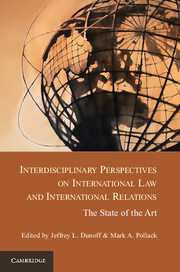 Interdisciplinary Perspectives on International Law and International Relations
Interdisciplinary Perspectives on International Law and International Relations An Agenda for the Next Generation of IL/IR Scholars
Published online by Cambridge University Press: 05 January 2013
Framing the Agenda
The intersection of international law and international relations (IL/IR) has developed into a sophisticated intellectual enterprise, as the papers in this volume attest. Although IL/IR continues to make important contributions to both disciplines, however, there remains room for further advances, in part by rebalancing the exchange between the two disciplines. This chapter suggests a research agenda for the field as it moves into its next generation. Our argument turns on a series of conceptual pairings: IL and IR, law at a point in time and law over time, values and interests (and with them constructivist and rationalist analyses), and especially law and politics. Our approach seeks to avoid privileging either side of these pairings, which are sometimes presented as (false) dichotomies; in fact, we argue that the vitality of the IL/IR nexus lies in its ability to bring together these elements and exploit the synergies and tensions among them.
International Law/International Relations
Much of the initial work in IL/IR (including our own) was oriented toward understanding IL from an IR perspective as “another” international institution. As a result, IL/IR scholarship has been somewhat one-sided, with IR (often wielded by lawyers) used to explain IL – mainly at a high level of generality – but with far less feedback from IL to IR. It is now time to reverse the gunsights: to ask what IL can contribute to IR, and what IL/IR has to offer traditional IL scholars and practitioners. We urge IL/IR scholars to engage more concretely with the practices of international law, a process which has already begun in this volume. Doing so, we suggest, will especially enrich rationalist/positivist IR analyses of law and legalization.
To save this book to your Kindle, first ensure [email protected] is added to your Approved Personal Document E-mail List under your Personal Document Settings on the Manage Your Content and Devices page of your Amazon account. Then enter the ‘name’ part of your Kindle email address below. Find out more about saving to your Kindle.
Note you can select to save to either the @free.kindle.com or @kindle.com variations. ‘@free.kindle.com’ emails are free but can only be saved to your device when it is connected to wi-fi. ‘@kindle.com’ emails can be delivered even when you are not connected to wi-fi, but note that service fees apply.
Find out more about the Kindle Personal Document Service.
To save content items to your account, please confirm that you agree to abide by our usage policies. If this is the first time you use this feature, you will be asked to authorise Cambridge Core to connect with your account. Find out more about saving content to Dropbox.
To save content items to your account, please confirm that you agree to abide by our usage policies. If this is the first time you use this feature, you will be asked to authorise Cambridge Core to connect with your account. Find out more about saving content to Google Drive.